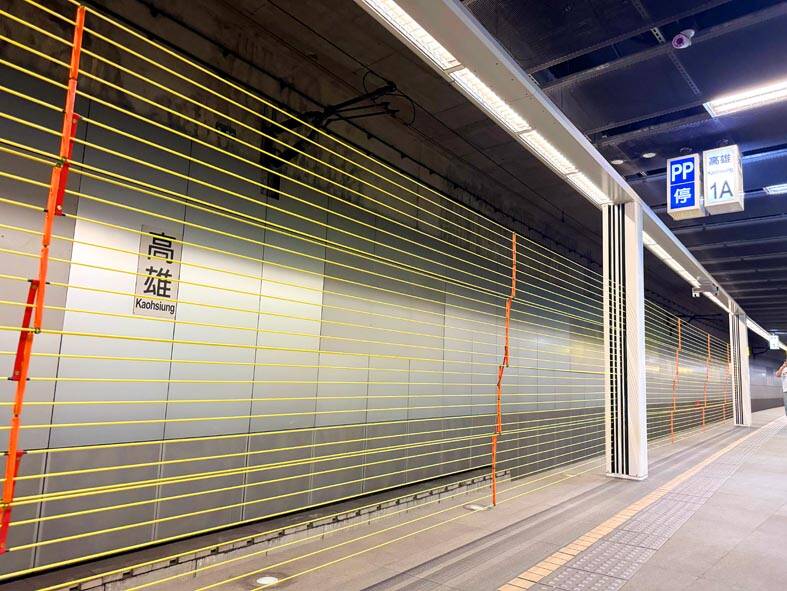Taiwan Railway Corp (TRC) plans to install rope screen doors on platforms in some stations to help prevent people from falling onto railway tracks.
The state-run railway company records an average of 10 intrusions on railway lines each year.
As a trial, TRC has installed a set of rope screen doors on one of the platforms at Kaohsiung Railway Station.

Photo: Tsai Yun-jung, Taipei
Local news media were invited to watch the progress of the trial on Wednesday.
The goal is to complete the installation of rope screen doors on the 300m-long platform by the end of this year and begin operations in March next year following a three-month test.
Construction is estimated to cost NT$149.8 million (US$4.6 million), the company said.
TRC president Feng Hui-sheng (馮輝昇) said that the company decided to hold the trial at Kaohsiung Railway Station, as it has a 300m-long platform and a wider variety of trains stop there.
“If the trial proves to be a success, trials at other stations would become easier,” Feng said.
The rope screen doors have a speed detector installed and would only lift when the device has determined that the train has come to a full stop and the train doors have opened, Feng said.
The light detection and ranging device on rope screen doors would also sound an alarm whenever people come too close to them, Feng said.
Specialists conducting the trial also said that people would be bounced back if they tried to run through the ropes, adding that most would find it difficult to climb over the steel ropes.
Feng said that the company decided to install rope screen doors rather than the platform doors seen at Taipei and Kaohsiung MRT stations for air ventilation on the platforms.
“Unlike the MRT systems, we have various train types, such as intercity trains and commuter trains. Some form a train set with eight cars, while others have 10 cars. The rope screen doors would be more appropriate, as the trains park at slightly different locations on platforms,” Feng said.
The company would install rope screen doors at railway stations depending on the number of passengers, the number of foreign object intrusion incidents and platform designs, Feng said.
Costs would gradually reduce when more rope screen doors are installed, Feng added.
The company would educate passengers on how the rope screen doors function before stipulating penalties for those who try to damage them, Feng added.

A preclearance service to facilitate entry for people traveling to select airports in Japan would be available from Thursday next week to Feb. 25 at Taiwan Taoyuan International Airport, Taoyuan International Airport Corp (TIAC) said on Tuesday. The service was first made available to Taiwanese travelers throughout the winter vacation of 2024 and during the Lunar New Year holiday. In addition to flights to the Japanese cities of Hakodate, Asahikawa, Akita, Sendai, Niigata, Okayama, Takamatsu, Kumamoto and Kagoshima, the service would be available to travelers to Kobe and Oita. The service can be accessed by passengers of 15 flight routes operated by

Alain Robert, known as the "French Spider-Man," praised Alex Honnold as exceptionally well-prepared after the US climber completed a free solo ascent of Taipei 101 yesterday. Robert said Honnold's ascent of the 508m-tall skyscraper in just more than one-and-a-half hours without using safety ropes or equipment was a remarkable achievement. "This is my life," he said in an interview conducted in French, adding that he liked the feeling of being "on the edge of danger." The 63-year-old Frenchman climbed Taipei 101 using ropes in December 2004, taking about four hours to reach the top. On a one-to-10 scale of difficulty, Robert said Taipei 101

MORE FALL: An investigation into one of Xi’s key cronies, part of a broader ‘anti-corruption’ drive, indicates that he might have a deep distrust in the military, an expert said China’s latest military purge underscores systemic risks in its shift from collective leadership to sole rule under Chinese President Xi Jinping (習近平), and could disrupt its chain of command and military capabilities, a national security official said yesterday. If decisionmaking within the Chinese Communist Party has become “irrational” under one-man rule, the Taiwan Strait and the regional situation must be approached with extreme caution, given unforeseen risks, they added. The anonymous official made the remarks as China’s Central Military Commission Vice Chairman Zhang Youxia (張又俠) and Joint Staff Department Chief of Staff Liu Zhenli (劉振立) were reportedly being investigated for suspected “serious

Taiwanese and US defense groups are collaborating to introduce deployable, semi-autonomous manufacturing systems for drones and components in a boost to the nation’s supply chain resilience. Taiwan’s G-Tech Optroelectronics Corp subsidiary GTOC and the US’ Aerkomm Inc on Friday announced an agreement with fellow US-based Firestorm Lab to adopt the latter’s xCell, a technology featuring 3D printers fitted in 6.1m container units. The systems enable aerial platforms and parts to be produced in high volumes from dispersed nodes capable of rapid redeployment, to minimize the risk of enemy strikes and to meet field requirements, they said. Firestorm chief technology officer Ian Muceus said